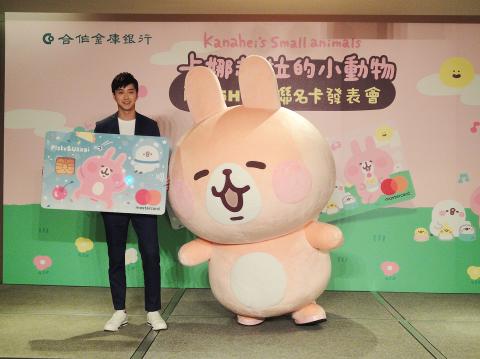State-run Taiwan Cooperative Bank (合庫銀行) has issued a new credit card featuring popular illustrated characters in a bid to to grab young customers.
The new credit card displays characters from Japanese illustrator Kanahei’s Small Animals series, which came out on top during the Line Sticker’s 2015 World Campaign with more than 10 million downloads. The stickers are especially popular in Taiwan, Thailand and Japan.
The bank, while having the most branches in Taiwan, could improve, particularly in winning over young customers, Taiwan Cooperative Financial Holding Co (合庫金控) chairman Lei Chung-dar (雷仲達) said on the sidelines of an event to launch the credit card on Tuesday last week.

Photo: Lu Kuan-cheng, Taipei Times
The bank has 485,000 cards in circulation, lagging behind state-run and private-sector rivals that tout figures of more than 1 million, Lei said.
The new credit card will hopefully help the bank reach its target of lowering the average age of its credit clients from 45 to 35 and increasing its number of credit card members to 500,000 by the end of the year, he said.
Toward that end, the bank has filmed a TV commercial featuring celebrity table tennis player Chiang Hung-chieh (江宏傑), Lei added.
However, the new credit card might not help raise per-card spending, which averages NT$9,700 (US$315.90) a month, with a 62 percent utilization rate, Lei said.
A bigger selection of cards helps lift overall credit card transactions, as different cards appeal to different clients, he said, adding that the bank has a co-branded credit card with buffet restaurant operator Hi-Lai Foods Co Ltd (漢來美食) and another card featuring the goddess Matsu.
The bank’s credit card transactions hit NT$20 billion in the first six months of this year, a 12.79 percent increase from the same period last year, which accounted for just 1.39 percent of the nation’s overall credit card spending of NT$1.44 trillion.

CAUTIOUS RECOVERY: While the manufacturing sector returned to growth amid the US-China trade truce, firms remain wary as uncertainty clouds the outlook, the CIER said The local manufacturing sector returned to expansion last month, as the official purchasing managers’ index (PMI) rose 2.1 points to 51.0, driven by a temporary easing in US-China trade tensions, the Chung-Hua Institution for Economic Research (CIER, 中華經濟研究院) said yesterday. The PMI gauges the health of the manufacturing industry, with readings above 50 indicating expansion and those below 50 signaling contraction. “Firms are not as pessimistic as they were in April, but they remain far from optimistic,” CIER president Lien Hsien-ming (連賢明) said at a news conference. The full impact of US tariff decisions is unlikely to become clear until later this month

Popular vape brands such as Geek Bar might get more expensive in the US — if you can find them at all. Shipments of vapes from China to the US ground to a near halt last month from a year ago, official data showed, hit by US President Donald Trump’s tariffs and a crackdown on unauthorized e-cigarettes in the world’s biggest market for smoking alternatives. That includes Geek Bar, a brand of flavored vapes that is not authorized to sell in the US, but which had been widely available due to porous import controls. One retailer, who asked not to be named, because

CHIP DUTIES: TSMC said it voiced its concerns to Washington about tariffs, telling the US commerce department that it wants ‘fair treatment’ to protect its competitiveness Taiwan Semiconductor Manufacturing Co (TSMC, 台積電) yesterday reiterated robust business prospects for this year as strong artificial intelligence (AI) chip demand from Nvidia Corp and other customers would absorb the impacts of US tariffs. “The impact of tariffs would be indirect, as the custom tax is the importers’ responsibility, not the exporters,” TSMC chairman and chief executive officer C.C. Wei (魏哲家) said at the chipmaker’s annual shareholders’ meeting in Hsinchu City. TSMC’s business could be affected if people become reluctant to buy electronics due to inflated prices, Wei said. In addition, the chipmaker has voiced its concern to the US Department of Commerce

STILL LOADED: Last year’s richest person, Quanta Computer Inc chairman Barry Lam, dropped to second place despite an 8 percent increase in his wealth to US$12.6 billion Staff writer, with CNA Daniel Tsai (蔡明忠) and Richard Tsai (蔡明興), the brothers who run Fubon Group (富邦集團), topped the Forbes list of Taiwan’s 50 richest people this year, released on Wednesday in New York. The magazine said that a stronger New Taiwan dollar pushed the combined wealth of Taiwan’s 50 richest people up 13 percent, from US$174 billion to US$197 billion, with 36 of the people on the list seeing their wealth increase. That came as Taiwan’s economy grew 4.6 percent last year, its fastest pace in three years, driven by the strong performance of the semiconductor industry, the magazine said. The Tsai